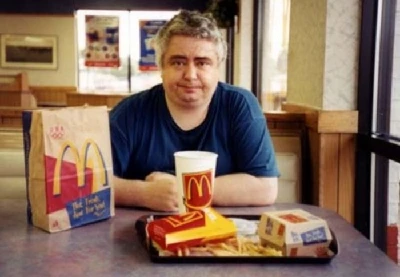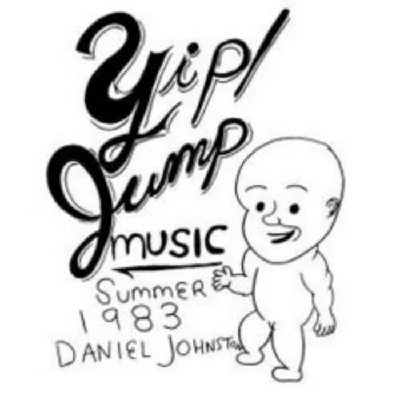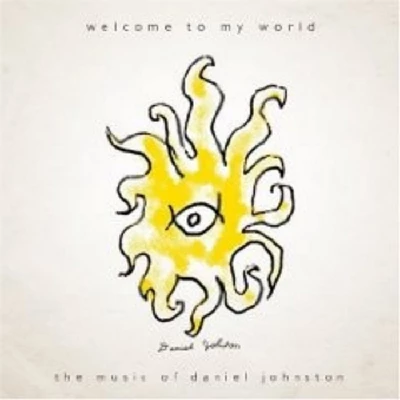published: 28 /
7 /
2009

Frail musical genius Daniel Johnston's albums will be reissued gradually over the rest of this year. Mark Rowland reflects upon the first of these reissues, his 1983 album, 'Yip/Jump Music', and a compilation, 'Welcome to My World'
Article
The first thing you notice when you listen to ‘Yip/Jump Music’ is the recording quality – drenched in hiss and slightly warped, it is fuzzy and inconsistent. The second thing you notice is the performance itself. Shuffling and ramshackle, it barely holds together, while the lispy vocals are reed thin and faltering. You may even laugh by this point. But then, if you give it a chance, instead of turning it off, you hear the songs. Simple but well constructed chord progressions, hooky melodies, and deceptively clever lyrics full of colourful imagery and subtle melancholy. No wonder so many people have fallen for the works of Daniel Johnston.
Artists as diverse as Sonic Youth, Eels, TV On the Radio, Kurt Cobain and Glen Hansard have paid tribute to Johnston over the years and many of them have performed cover versions of his work. If you search YouTube for Daniel Johnston covers, you will find seemingly endless videos of people covering his songs in the comfort of their own bedrooms.
Since Johnston started writing and recording his music at his parent’s house in the late 70s, he has managed to attract a cult following. His music appeals to a certain kind of music fan; those that don’t mind shaky performances and lo fi recordings, and who find Johnston’s wide-eyed fragility endearing and moving.
For the uninitiated, a good starting point is the recently reissued compilation ‘Welcome to My World’. Predominantly spanning his early, organ and piano-based recordings, it features several of his best-loved songs (though fan favourite ‘Go’ is conspicuously absent). Songs like ‘Walking the Cow’, ‘Casper the Friendly Ghost’ and ‘Never Relaxed’ have silly lyrics, but their initial child-like veneer breaks down on repeated listens to reveal a melancholic undertone. Songs such as ‘Peek A Boo’ and ‘Devil Town’ are more immediate in their sadness. When Johnston sings “Please hear my cry for help/ and save me from myself’ on the former song, you know he means it.
The songs from 1990 (such as ‘Devil Town’) are perhaps the most heartbreaking on the compilation. By that point, Johnston was suffering quite severely from his bi-polar disorder, and as a result, his songs have an even greater fragility. It seemed that the lifestyle that came with his rapidly increasing cult status (thanks to an appearance on MTV’s 'Cutting Edge' show) had taken its toll, kick-starting a period of wildly erratic behaviour delusions and violent mood swings in which he was institutionalised twice.
During this time, the wider world was taking more and more interest in his music, and his tapes were being sold in record shops across the US. One of the most popular was ‘Yip/Jump Music’, which has also been reissued in Europe; one of Kurt Cobain’s favourite records of all time.
Featuring several of his best-known songs – ‘Chord Organ Blues’, Casper the Friendly Ghost’, ‘Don’t Let the Sun Go Down on your Grievances’ and ‘Speeding Motorcycle’, the album is one of his earliest, recorded on a $59 boombox, with Johnston accompanying himself on a chord organ and, occasionally, an out of tune ukulele. In addition to the aforementioned songs, it features one of his many love songs to his favourite band of all time, ‘The Beatles’, his amusingly wonky attempt at rap on ‘Danny Don’t Rapp’, the acappella blues of ‘King Kong’ and the sweetly optimistic ‘I Live for Love’. ‘Almost Got Hit By a Truck’ is one of the best songs on the album, with a strong riff throughout the verse, which breaks down into a slow, sweet, sad chorus. ‘Worried Shoes’ is another highlight, the longest and most melancholic song on the album, it’s hard not to be touched by it.
Those who can’t see past the scratchy, warts 'n' all recordings or the wavering voice to hear the brilliance in Johnston’s work should listen to the many cover versions of his songs. As Louis Black, the editor of 'The Austin Chronicle', said in his liner notes for ‘Welcome to My World’, the covers make “the brilliance and craft of Johnston’s songwriting obvious.” But, as Black also says, something is lost in translation. The cover versions are slicker, the arrangements bigger, but none can recreate the captivating, raw conviction of Johnston’s versions. The best thing for the unsure listener to do is to stick with it; give it time. With patience, a whole world will open up to you, starting with the willfully naïve imagery of his songs and continuing with his unnervingly childlike art (though Johnston is also known to produce more detailed drawings and watercolours). It’s a fascinating insight into Johnston’s mind, but it’s also more than that. It reaches out and touches you. While it is not always instantly translatable, everyone to a certain extent has experienced the emotions behind Johnston’s work – who hasn’t pined for someone that they could never have, or carried the weight of loneliness upon their shoulders?
With a spate of reissues due across the rest of the year, a forthcoming new album and another Daniel Johnston movie, it looks like the time is right for a new generation to discover his genius.
Have a Listen:-
Picture Gallery:-

